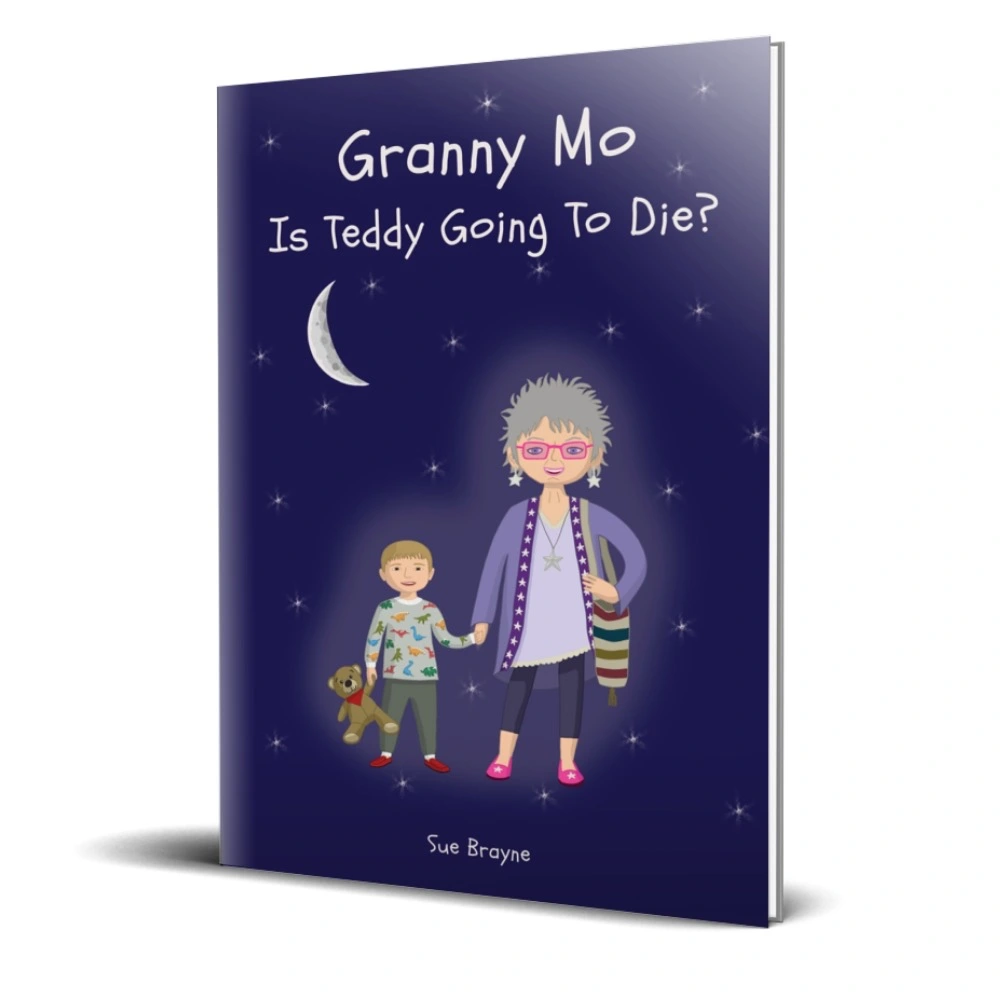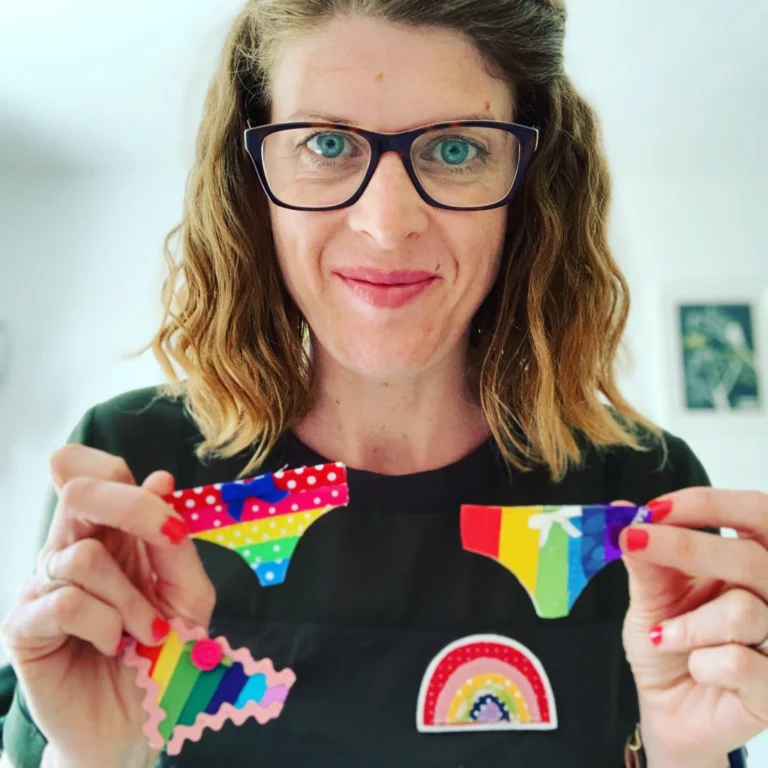A huge thank you to Instinctive Living for publishing this blog on talking to children about death and dying. Check out the wonderful work Instinctive Living is doing in helping us all to share our creativity and inspiration with each other.

I am delighted to introduce you to the world of Granny Mo, whose job is to help children and adults to talk together about death and dying. However, first I want to tell you why she came into being.
It all started with Jack, my not-yet four-year-old grandson asking out of the blue while he was having lunch, ‘Am I going to die one day?’ His mother glanced at me in alarm and mouthed, ‘Over to you!’
I told him, ‘Yes, you will die one day and so will your sister and your mummy and daddy, and I will too. Everyone dies just as everyone is born – that’s how life is created.’
‘Oh,’ said Jack, looking me straight in the eye, holding his fork in mid-air. As I had been caught completely on the hop, I found myself saying, ‘When you die, an angel will come and collect you so you will feel very safe and cared for.’ In retrospect, this wasn’t the best thing to say, because lots of people don’t believe in angels. But I wanted to give him a message that he would feel safe when he died.
In any case, the thought of angels didn’t bother him because he beamed at me and said: ‘That’s okay then,’. He carried on with his lunch as if nothing abnormal had happened. His mother and I exchanged looks of amazement, but his one-year-old sister started demanding more food and the chaos of feeding two lively young children took over.
I kept on thinking about Jack’s question and the way I had responded to him. Even though I have been helping people to talk about death and dying for the past twenty years, I realised I had been completely unprepared for such a searing question to be raised by my young grandson. It made me wonder what had been going on in his head. Then I remember how I had become aware of my own mortality around the same age as Jack but had never spoken about it to anyone. It took a close shave with death when I was thirty-seven to wake up to how precarious life is and how death walks at our shoulder all the time.
Why talk about death and dying?
This realisation set me on the healing path which culminated in an MA in the Rhetoric and Rituals of Death and then to become a researcher and writer about end-of-life experiences. What I learnt from my research really helped me to address my fear of death and made me deeply question why we have turned something that is going to happen to every single one of us on this planet into such a taboo subject. As I continued to interview people about the way we don’t talk about death, I began to realise that one of the major reasons is because most people don’t know how to respond to it. They become literally tongue-tied through fear of getting it wrong and making things worse.
Nevertheless, I strongly believe we need to get a grasp of our fear around talking about death and dying otherwise we will continue to pass this paralysing taboo down the generations. I have heard so many tragic stories from people, who, as children, were prevented from talking about the death of a treasured parent, grandparent or sibling and the negative impact this had on their ability to relate healthily to life and to express trust and love.
As I know myself, when we live in the denial of death or we are too scared to talk about it, it makes us feel lonely, afraid and disconnected from each other. Let’s face it, our younger generations are going to inherit enough problems without inheriting that too.
So how can we overcome our fear of talking to children about death and dying?
Here are some pointers which I have discovered can really help:
- The first thing is to look at our own relationship with death and dying. If we’re uncomfortable with it, we will pass this discomfort onto our children and close the conversation down. If we are comfortable with our mortality, the child will feel safe to explore things further.
- Children know far more than we adults believe they do. Children also want the truth and can spot a lie at twenty paces. So, always be honest with them. If you don’t know the answer to something, suggest that you help them look it up. For example, on the internet or through reading a book.
- Death and dying are big issues for a young child to understand. Therefore, take it at their pace and don’t push the conversation. A child will often think a lot about things before voicing them.
- Always use plain words. Words such as ‘death’ or ‘dead’ rather than saying, ‘gone to sleep,’ ‘gone away’ or someone’s lost.’ This is very confusing for a child.
- Try not to instil your own beliefs about death and dying as ultimate truths. No one really knows what happens after we die.
- If a child is expressing fear or anxiety about death or dying, really listen to them. This demonstrates that they are being taken seriously and what they say matters.
- Don’t placate them by saying things like: ‘You’re too young to think like that’ or ‘there’s nothing to worry about.’ It will increase their anxiety around death and dying.
- Talk to children at their level and use language they relate to. For example, a pre-school teacher told me that very young children are describing the current pandemic along the lines of a ‘badly bug’ which is stopping them from seeing granny and grandpa. It’s making granny or grandpa ill or they are dying from it.
- If you are concerned about your child’s questions about death and dying talk to their teacher and see how you can provide further support.
- Be aware that talking about death and dying to your child may bring up difficult feelings for you. Especially if you are speaking about a family member who has recently died. Make sure you find appropriate support if you need it.
- Always encourage children to know it’s normal to feel sad and to cry when someone’s dying or has died.

Granny Mo to the Rescue
You now have Granny Mo to help as well. Following my conversation with Jack, I realised I wanted to create a series of books to address how we talk to children about death and dying. When Granny Mo appeared in my head, I knew she was the right voice and character to give adults the confidence and skills to support a child who needs time to absorb these big life questions and to make sense of what they may be feeling. I hope you will grow to love Granny Mo as much as I do.

Is Teddy going to die? This first book in the Granny Mo series addresses questions about death and dying, which can leave many mummies and daddies, grannies, grandpas, and everyone else who cares for young children unsure of what to
say or the right way to say it.
Granny Mo is taking a stand for small independent publishers, so please order Is Teddy Going to Die?
FROM LOSS BOOKS
Finally, a book which talks about death and dying in a compassionate and open way to young children
Michelle Hawkins- Collins, Consultant Gerontologist
I love Granny Mo, and I especially love that she is utterly matter of fact. Death
Fiona Waters, Children’s Book Consultant
cannot be explained by whimsy or twee trite or so-called consolation
Granny Mo’s is the perfect resource to help both children and parents navigate these challenging times.
Charlotte Adcock, Nursery School Manager





